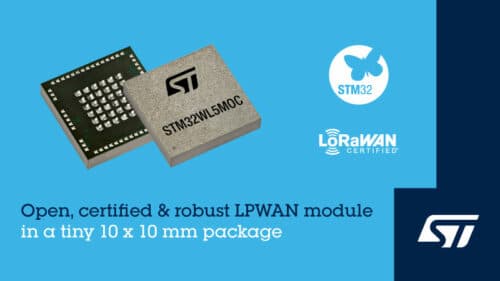The IoT System-in-Package module features a dual-core SoC for wireless connectivity in devices like meters and sensors.

STMicroelectronics has launched an IoT System-in-Package (SiP) module, the STM32WL5MOC, featuring a dual-core STM32WL55JC wireless system-on-chip (SoC). This module is designed for devices like remote metering, monitoring, and smart-sensing, providing LPWAN wireless connectivity.
The SiP, housed in an LGA92 10mm x 10mm package, integrates the SoC with components like frequency-controlled oscillators, an IC containing a balun, filter, matching network, a receive/transmit switch, and other necessary passives. This integration facilitates RF design, conserves space, and simplifies circuit layout, reducing the time and expense associated with RF design.
This SiP module enables data communication with power consumption, supporting a system battery life of over ten years. It operates in the 864MHz to 928MHz band, allowing global use, and comes pre-certified for LoRaWAN and Sigfox networks. The wireless subsystem supports modulation schemes, including (G)FSK, (G)MSK, BPSK, and LoRa modulation. It is compatible with standard and proprietary protocols like wM-Bus, Wi-Sun, Mioty, and others. The RF output power is adjustable up to 22dBm in the US and Asian territories or 15dBm according to European regulations.
The module utilizes the dual-core architecture of the SoC, featuring 256KB Flash and 64KB RAM, ensuring performance for user applications. The SoC’s Arm Cortex-M4 core with DSP extensions and Cortex-M0+ offer memory security protection. The Cortex-M0+ core provides secure services such as key management, firmware installation and updates, and a sub-GHz MAC layer. An optional version with an onboard STSAFE-A110 is available to improve data and network security.
The module is integrated into the STM32 development ecosystem and is supported by the STM32CubeMX tool for project initialization and software development. The B-WL5M-SUBG1 wireless prototyping board, which includes an STM32WL5MOC module, is available for evaluation and software integration. The USB-powered board comes ready with an antenna and requires no additional setup.
For more information, click here.








